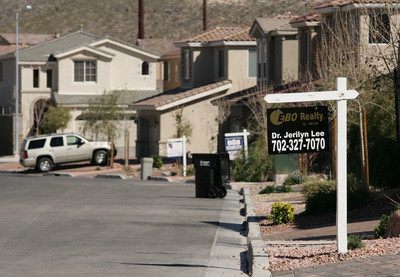Analyst senses slump’s bottom

There’s been a lot of talk about the Las Vegas housing market reaching the bottom, backed by statistics showing an increase in February home sales and stabilized inventory.
Median existing-home prices have fallen to $237,000, below the $240,000 threshold that local housing analysts predicted would be the low point. Las Vegas made national headlines again this week with a 19 percent decline in the January Standard & Poor’s/Case-Shiller home price index, tied with Miami for the biggest drop among 20 cities measured in the index.
New-home sales in Las Vegas are down 49 percent for the first two months of the year, existing-home sales are off 37 percent and home building permits have plunged 70 percent, housing analyst Dennis Smith said Wednesday at Las Vegas Housing Outlook 2008.
"Obviously we’ve got tight credit and qualifying requirements," the president of Home Builders Research said. "Those are factors, too. I could go on and on. I think we’re close to the bottom, but it’s going to be an extended bottom."
Any recovery won’t be in the shape of a "V" but a flat-bottom "U," Smith told about 7 00 builders, developers, mortgage brokers and real estate agents at the Las Vegas Convention Center.
He predicted that median new-home prices will finish the year at $274,000, about $1,000 more than February’s median, though it will dip further between now and then. He thinks 2009 will show a 2.2 percent increase to $280,000 and 2010 will be about the same, with prices conservatively climbing to $286,000.
"We had many years of 1.5 percent to 2 percent increases and that’s what we’re going back to," Smith said.
Resale prices, which are down 5.2 percent so far this year, will rise again by about 1.3 percent in 2009 to $240,000, he predicted.
Bernard Markstein, director of forecasting and analysis for the Washington, D.C.-based National Home Builders Association, sees a modest rebound in this year’s second half with some pick-up in sales activity. New-home sales have bottomed out and builders have cut back on new starts, he said.
"It almost couldn’t get any worse. I hate to say that," Markstein said at forum. "The tough times are not over, but we may be reaching the bottom. Of course, affordability remains an issue, but prices are starting to adjust."
Tighter lending requirements have acted as a drag on the housing market, he said. That can be a problem in terms of getting buyers.
Almost all of the foreclosure problems have been with subprime and adjustable-rate mortgages, not with fixed-rate mortgages, Markstein noted, yet lenders are tightening up across the board.
"What’s going to get us out of this? Demand needs to stabilize and improve before there is a recovery," he said. "Again, we’re talking about a modest rebound. We don’t want to get back to 2004."
U.S. Sen. Harry Reid, D-Nev., who spoke to a group of Hispanic real estate agents in Las Vegas last week, said he’s glad that Congress bailed out New York investment bank Bear Stearns Cos., but there also needs to be legislation to help desperate people in danger of losing their home to foreclosure, not speculators.
"We have to try to keep people in their homes," Reid told the Review-Journal. "Otherwise, we’re in big trouble. Two main things drive the economy — road building and house building. Both of them generate high-paying jobs."
Reid said he’d like to see mortgage revenue bonds, which are only legal now to buy new homes, extended to resales and foreclosures. He would also like to use community development block grants, or CDBGs, for state and local governments to go into a neighborhood, buy foreclosed properties and set up programs for people to buy them as primary residences.
Contact reporter Hubble Smith at hsmith@reviewjournal.com or (702) 383-0491.